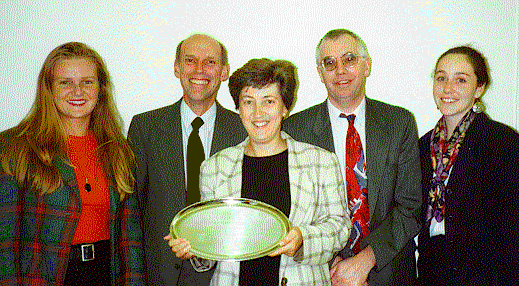eLib Column
As autumn begins to paint her subtle colours across the English countryside the good folks at the Electronic Libraries Programme office find themselves raking in project annual reports. As part of the programme's evaluation strategy, all projects now up and running were required to submit a report by mid- August detailing progress to date and, more importantly, lessons learned thus far. The report was to include all the conventional contents of an annual report - facts and figures, but was also to include the projects preliminary evaluation results. With 60 projects funded the programme is certainly in full swing and it is time to begin asking "so....how are we doing?"
Programme Success vs. Project Success
It is conceivable that a national programme like eLib could produce 60 very successful projects at the end of 2 or 3 years (in fact we hope so) but that the programme itself would have little or no impact on UK Higher Education. An important key to the true success of the programme is to continually ensure that the results of eLib projects - whether positive or negative - don't remain in isolation with the project but are finding their way out into the HE community. The eLib programme will only be successful if its results are disseminated and have an impact. Even a small drop in the proverbial bucket can ripple its effect a long way.
To an extent this means revisiting the term "failure". What does it mean for a project to fail? In terms of the eLib programme it may simply mean a project that doesn't ripple its results anywhere to anyone. Even if a project established the most innovative and informative electronic journal in the UK, if it doesn't produce a model that others in the wider community can use or learn from, it may be a failure in the long term.
On the other hand, because of the innovative nature of many of these projects, they ride the crest of the new technologies wave and may find themselves pulled under. If this is the case, we must examine what it is we learn from that project. Is the technology not appropriate? Are copyright difficulties too complex? If the organisational environment resists the change proposed by an eLib project what work is necessary to begin institutional/organisational/cultural change which will provide a more responsive environment? What can we learn from a project's failure to meet it's proposed goals which will make the programme a success?
By and large the eLib annual reports have yielded some honest, open feedback which will help the eLib programme begin to disseminate it's preliminary results. The annual reports will be read by both the programme office and by the Tavistock Institute who will then produce a synthesis of the reports' findings to be distributed to the rest of the UK Higher Education.
A welcome pat on the back

Alice Colban, Chris Rusbridge, Lynne Brindley, David Cook and Kelly Russell pick up the Jason Farradane Award
As eLib begins the somewhat onerous task of disseminating initial evaluation results, it was exciting and encouraging to hear that the Electronic Libraries Programme has been awarded the Jason Farradane Award for its contribution to the field if Information Science. The award is given annually by the Institute of Information Scientists and this year Lynne Brindley, chairman of FIGIT, will accept it on behalf of eLib and the Joint Information Systems Committee.
